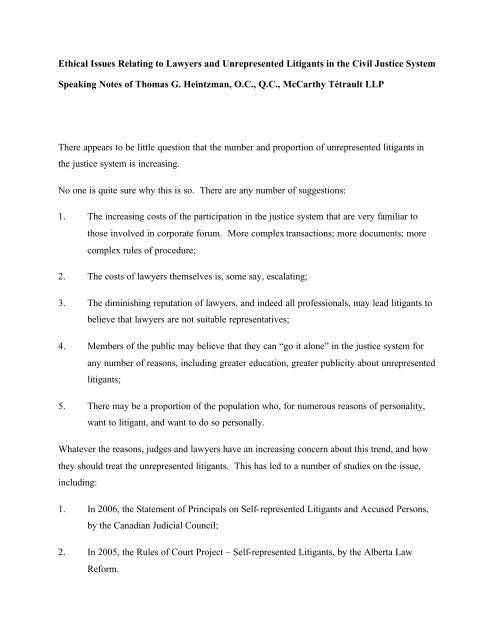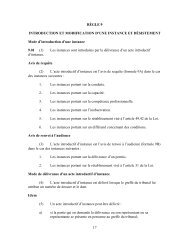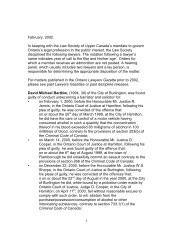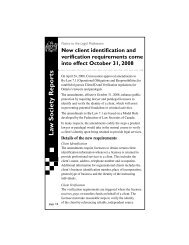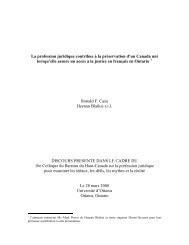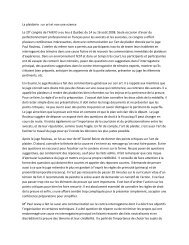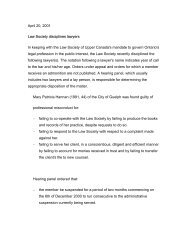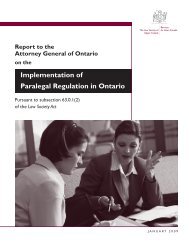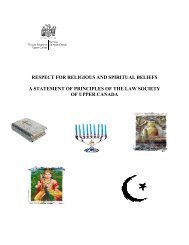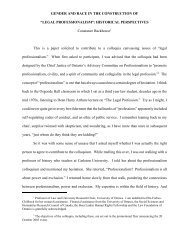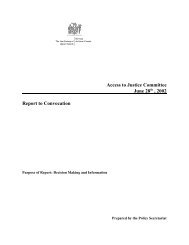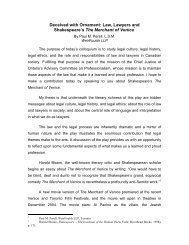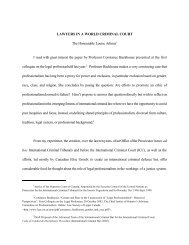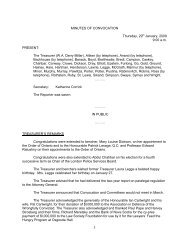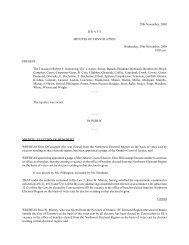Ethical Issues Relating to Lawyers and Unrepresented Litigants in ...
Ethical Issues Relating to Lawyers and Unrepresented Litigants in ...
Ethical Issues Relating to Lawyers and Unrepresented Litigants in ...
You also want an ePaper? Increase the reach of your titles
YUMPU automatically turns print PDFs into web optimized ePapers that Google loves.
<strong>Ethical</strong> <strong>Issues</strong> <strong>Relat<strong>in</strong>g</strong> <strong>to</strong> <strong>Lawyers</strong> <strong>and</strong> <strong>Unrepresented</strong> <strong>Litigants</strong> <strong>in</strong> the Civil Justice SystemSpeak<strong>in</strong>g Notes of Thomas G. He<strong>in</strong>tzman, O.C., Q.C., McCarthy Tétrault LLPThere appears <strong>to</strong> be little question that the number <strong>and</strong> proportion of unrepresented litigants <strong>in</strong>the justice system is <strong>in</strong>creas<strong>in</strong>g.No one is quite sure why this is so. There are any number of suggestions:1. The <strong>in</strong>creas<strong>in</strong>g costs of the participation <strong>in</strong> the justice system that are very familiar <strong>to</strong>those <strong>in</strong>volved <strong>in</strong> corporate forum. More complex transactions; more documents; morecomplex rules of procedure;2. The costs of lawyers themselves is, some say, escalat<strong>in</strong>g;3. The dim<strong>in</strong>ish<strong>in</strong>g reputation of lawyers, <strong>and</strong> <strong>in</strong>deed all professionals, may lead litigants <strong>to</strong>believe that lawyers are not suitable representatives;4. Members of the public may believe that they can “go it alone” <strong>in</strong> the justice system forany number of reasons, <strong>in</strong>clud<strong>in</strong>g greater education, greater publicity about unrepresentedlitigants;5. There may be a proportion of the population who, for numerous reasons of personality,want <strong>to</strong> litigant, <strong>and</strong> want <strong>to</strong> do so personally.Whatever the reasons, judges <strong>and</strong> lawyers have an <strong>in</strong>creas<strong>in</strong>g concern about this trend, <strong>and</strong> howthey should treat the unrepresented litigants. This has led <strong>to</strong> a number of studies on the issue,<strong>in</strong>clud<strong>in</strong>g:1. In 2006, the Statement of Pr<strong>in</strong>cipals on Self-represented <strong>Litigants</strong> <strong>and</strong> Accused Persons,by the Canadian Judicial Council;2. In 2005, the Rules of Court Project – Self-represented <strong>Litigants</strong>, by the Alberta LawReform.
- 2 Presently, I have been a Chair of a Committee of the American College of Trial <strong>Lawyers</strong> whichhas drafted a Code of Conduct for trial lawyers <strong>in</strong> trials <strong>in</strong>volv<strong>in</strong>g unrepresented litigants.My role as Chair of the Committee which has drafted these rules had led me <strong>to</strong> conc lude thatthere are a number of issues fac<strong>in</strong>g lawyers <strong>in</strong> trial <strong>in</strong>volv<strong>in</strong>g unrepresented litigants. They<strong>in</strong>clude the follow<strong>in</strong>g:1. Does a lawyer represent<strong>in</strong>g a client <strong>in</strong> a proceed<strong>in</strong>g (or transaction) owe a duty <strong>to</strong> theoppos<strong>in</strong>g unrepresented litigant? If so, what is the nature of that duty?2. Can or should a lawyer tell a litigant <strong>to</strong> reta<strong>in</strong> a lawyer?3. What is the duty of the court <strong>to</strong> the lawyer, if the unrepresented litigant is given an<strong>in</strong>dulgence by the court?4. What is the duty of the lawyer <strong>to</strong> the court or the unrepresented litigant if a lawyer asksfor an <strong>in</strong>dulgence from the court?5. Do the rules of professional conduct:(a)(b)apply <strong>to</strong> the unrepresented litigant?; (<strong>and</strong>, particularly if they do not)do the rules of professional conduct apply <strong>to</strong> lawyer when deal<strong>in</strong>g withunrepresented litigants?6. Should the rules of evidence (or other laws) strictly apply <strong>to</strong> unrepresented litigantsdur<strong>in</strong>g the course of a hear<strong>in</strong>g?7. Is the lawyer under a duty <strong>to</strong> provide concessions <strong>to</strong> an unrepresented litigant, or <strong>to</strong> waivean advantage held by the lawyer’s client when deal<strong>in</strong>g with an unrepresented litigant?8. Is a lawyer entitled <strong>to</strong> take any advantage of the fact that a litigant is unrepresented, orimpose any hardship or disadvantage on an unrepresented litigant?9. Does a lawyer have a duty <strong>to</strong>ward his or her client <strong>to</strong> discuss the implications of a trialaga<strong>in</strong>st an unrepresented litigant?McCarthy Tétrault LLP TDO-MCTET1 #4201251 v. 1
- 3 10. How should a lawyer communicate with an unrepresented lawyer? Must the lawyeradvise the court of all material communications with the unrepresented litigant? Is therea different st<strong>and</strong>ard of conduct applicable <strong>to</strong> a lawyer when settl<strong>in</strong>g with anunrepresented litigant than settl<strong>in</strong>g with a represented litigant?I <strong>in</strong>tend only <strong>to</strong> address three of these questions. The first question is perhaps the most important<strong>and</strong> fundamental because it shapes the debate on other questions: Does a lawyer have a duty <strong>to</strong>the unrepresented litigant? Our Committee came <strong>to</strong> the basic answer: no. Or, more properlyput, it is our view that the lawyer’s duty can be better unders<strong>to</strong>od as a duty <strong>to</strong> the court, <strong>and</strong> aduty <strong>to</strong> his or her professional organization, not a duty <strong>to</strong> the oppos<strong>in</strong>g party.Obviously, <strong>in</strong> a court sett<strong>in</strong>g or transaction sett<strong>in</strong>g, a lawyer cannot act <strong>in</strong> a way which amounts<strong>to</strong> a civil wrong, whether or not the oppos<strong>in</strong>g party is represented or not. The lawyer cannotdefame the unrepresented party. The lawyer cannot deceive the unrepresented party. But oncethose limits are recognized, any further obligation of the lawyer <strong>to</strong> the unrepresented party wouldhave <strong>to</strong> be based upon a duty <strong>to</strong> that party.It is difficult <strong>to</strong> see the basis of such a duty <strong>in</strong> an adversarial sett<strong>in</strong>g. Apart from the duty <strong>to</strong> thecourt <strong>and</strong> his professional regulat<strong>in</strong>g body, the lawyer’s only duty is <strong>to</strong> the client. The lawyer isprohibited from creat<strong>in</strong>g any conflict of <strong>in</strong>terest between that duty <strong>and</strong> a duty <strong>to</strong> others. Thelawyer must “fearlessly” advocate for the client <strong>and</strong> must “obta<strong>in</strong> for the client the benefit of any<strong>and</strong> every remedy <strong>in</strong> defence which is authorized by law”, subject of course <strong>to</strong> the pr<strong>in</strong>ciples oflegality <strong>and</strong> the duty <strong>to</strong> the court <strong>and</strong> the profession. These obligations are clearly set forth <strong>in</strong>Rules 3, 5, 6 <strong>and</strong> 9 of the Code of Professional Conduct of the Canadian Bar Association.Accord<strong>in</strong>gly, there appears <strong>to</strong> be no basis <strong>to</strong> establish any duty of the lawyer <strong>to</strong> the unrepresentedlitigant.That is the fundamental issue or question, <strong>and</strong> it might well be the subject matter of debate here<strong>to</strong>day.A more satisfac<strong>to</strong>ry approach, <strong>in</strong> our view, <strong>to</strong> the lawyer’s duty, can be found <strong>in</strong> approach<strong>in</strong>g theissue from the lawyer’s duty <strong>to</strong> the court, <strong>and</strong> <strong>to</strong> his or her professional body. But stat<strong>in</strong>g theMcCarthy Tétrault LLP TDO-MCTET1 #4201251 v. 1
- 5 A third issue which we can discuss <strong>to</strong>day is whether the laws of evidence, or other laws, shouldbe bent or waved <strong>in</strong> favour of an unrepresented litigant. Some judges say that the rules ofevidence – say, the hearsay rule – are <strong>to</strong>o technical <strong>to</strong> be apply aga<strong>in</strong>st an unrepresented litigant.Our view is that these laws do apply <strong>to</strong> unrepresented litigants. Courts cannot have rules forrepresented litigants <strong>and</strong> other rules for unrepresented litigants. Courts have an obligation <strong>to</strong>apply the law equally <strong>to</strong> all. What the court can do – <strong>and</strong> may have <strong>to</strong> do – is <strong>to</strong> take the time <strong>to</strong>expla<strong>in</strong> those rules <strong>to</strong> unrepresented litigants.Here is one place where the lack of legal knowledge or expertise of the unrepresented litigantmay throw a burden on the lawyer. The lawyer may have a duty <strong>to</strong> expla<strong>in</strong> <strong>to</strong> the court the legalimplications of certa<strong>in</strong> evidence, or submissions or proceed<strong>in</strong>g. In our draft Code, we stated thisproposition as follows:“4(b) As an officer of the court, a trial lawyer rema<strong>in</strong>s under a duty of c<strong>and</strong>our, fairness, courtesy<strong>and</strong> respect <strong>to</strong> the court when the oppos<strong>in</strong>g party is an unrepresented party. That duty requiresthat the trial lawyer’s participation enables the court <strong>to</strong> provide a fair <strong>and</strong> impartial hear<strong>in</strong>g for allparties represented <strong>and</strong> unrepresented.4(c) In light of duties owed <strong>to</strong> the client, a trial lawyer is entitled <strong>to</strong> raise every argument he orshe believes may help the client’s case, <strong>and</strong> is not required <strong>to</strong> assist or extend <strong>in</strong>dulgences <strong>to</strong> anunrepresented litigant if it would compromise the rights <strong>and</strong> <strong>in</strong>terests of the trial lawyer’s client.”Accord<strong>in</strong>gly, the la wyer may have <strong>to</strong> navigate conflict<strong>in</strong>g duties, <strong>to</strong> the court <strong>and</strong> <strong>to</strong> his client.As the commentary <strong>to</strong> this rule states, the lawyer may be under a “high st<strong>and</strong>ard of conduct as anofficer of the court <strong>in</strong> the presence of an unrepresented litigant”. In this sett<strong>in</strong>g, there may be ahigher duty <strong>to</strong> present unfavourable authority, or draw<strong>in</strong>g attention <strong>to</strong> legislative provisions, orensure that evidence is not misstated, which would normally be undertaken by oppos<strong>in</strong>g counsel.Nevertheless, it is our view that the lawyer should “refuse any request by the bench or anyoneelse that would put the trial lawyer <strong>in</strong> a conflict of <strong>in</strong>terest with his or her client by favour<strong>in</strong>g orassist<strong>in</strong>g the unrepresented party”.The fourth area of ethical consideration is whether a lawyer can ever take advantage of anunrepresented litigant. Our view is that a lawyer can not take undue advantage of anMcCarthy Tétrault LLP TDO-MCTET1 #4201251 v. 1
- 6 unrepresented litigant, that is, an advantage due solely <strong>to</strong> the fact that the litigant isunrepresented. But it will be difficult <strong>to</strong> f<strong>in</strong>d the boundary l<strong>in</strong>e between tak<strong>in</strong>g “undue”advantage of an unrepresented litigant, <strong>and</strong> merely enforc<strong>in</strong>g client’s rights.We stated the proposition as follows:“7(a) A trial lawyer must not attempt <strong>to</strong> derive benefit for his or her client at trial with anunrepresented litigant due <strong>to</strong> the fact that the litigant is unrepresented, <strong>and</strong> should avoid impos<strong>in</strong>gunnecessary disadvantage, hardship, or confusion on the unrepresented litigant.7(b) A trial lawyer is entitled <strong>to</strong> raise proper <strong>and</strong> legitimate technical <strong>and</strong> procedural objectionsbut should not take advantage of technical deficiencies <strong>in</strong> the plead<strong>in</strong>gs, procedural steps, orpresentation of the case aga<strong>in</strong>st an unrepresented party which do not go <strong>to</strong> the merits of the caseor the legitimate rights <strong>and</strong> <strong>in</strong>terests of the client.”As you can see, we placed the emphasis on the lawyer not tak<strong>in</strong>g advantage of technicalities thatdo not go <strong>to</strong> the real merits or legitimate expectations of a client. Aga<strong>in</strong>, the boundary l<strong>in</strong>ebetween “<strong>in</strong>sist<strong>in</strong>g upon a legitimate technical or procedural deficiencies, on the one h<strong>and</strong>, <strong>and</strong>not tak<strong>in</strong>g advantage of technical deficiencies which “do not go <strong>to</strong> the real merits or legitimateexpectations of the client” is a difficult one <strong>to</strong> establish. There is a “fairness spectrum” <strong>in</strong> whichthe particular conduct will have <strong>to</strong> be judged. Clearly, when faced by an unrepresented client,the client’s duty is closer <strong>to</strong> the latter end of the spectrum, that is, <strong>to</strong> not <strong>in</strong>sist<strong>in</strong>g on technicaldeficiencies.McCarthy Tétrault LLP TDO-MCTET1 #4201251 v. 1


